![[Commie] Psycho-Pass - 15 [376FAAD3].mkv_snapshot_05.26_[2013.02.02_10.06.16] [Commie] Psycho-Pass - 15 [376FAAD3].mkv_snapshot_05.26_[2013.02.02_10.06.16]](https://lh5.ggpht.com/-IfaoSqEpiz4/UQy5xHRYdYI/AAAAAAACjkU/S0IP_skeQkY/%25255BCommie%25255D%252520Psycho-Pass%252520-%25252015%252520%25255B376FAAD3%25255D.mkv_snapshot_05.26_%25255B2013.02.02_10.06.16%25255D_thumb.jpg?imgmax=800) |
![[Commie] Psycho-Pass - 15 [376FAAD3].mkv_snapshot_07.58_[2013.02.02_10.09.21] [Commie] Psycho-Pass - 15 [376FAAD3].mkv_snapshot_07.58_[2013.02.02_10.09.21]](https://lh5.ggpht.com/-cOdI-yStXYY/UQy5ymT25gI/AAAAAAACjkk/pXqqOPoLrik/%25255BCommie%25255D%252520Psycho-Pass%252520-%25252015%252520%25255B376FAAD3%25255D.mkv_snapshot_07.58_%25255B2013.02.02_10.09.21%25255D_thumb.jpg?imgmax=800) |
![[Commie] Psycho-Pass - 15 [376FAAD3].mkv_snapshot_16.01_[2013.02.02_10.17.32] [Commie] Psycho-Pass - 15 [376FAAD3].mkv_snapshot_16.01_[2013.02.02_10.17.32]](https://lh4.ggpht.com/-bd2XqBTWxYw/UQy52dMeKfI/AAAAAAACjk0/omBuRKgR1Ko/%25255BCommie%25255D%252520Psycho-Pass%252520-%25252015%252520%25255B376FAAD3%25255D.mkv_snapshot_16.01_%25255B2013.02.02_10.17.32%25255D_thumb.jpg?imgmax=800) |
I wonder if Urobuchi Gen has heard the criticism that Psycho-Pass isn’t exactly an original idea.
There’s no doubt that having Makishima compare the Tokyo of the series’ creation to Gibson, Orwell and Philip K. Dick had the feeling of a wink at the audience – and I’ll give him credit for landing on the right answer as to whose fiction was closest to the show’s reality (Dick). There’s always a fine line between inspiration and derivativeness, I suppose, but while this certainly isn’t Gen’s most groundbreaking idea it’s nevertheless fascinating to see him take on the Philip K. Dick model and put his own unique spin on it.
One thing I’m definitely discovering is that I like Psycho-Pass better when it’s narrowly focused than when it tries to go big. As is often the case with Gen shows I found the best part of the episode to be a conversation, this one between Makishima and the hacker Choe Gu-Sung – who really does appear to be his right-hand man. These have tended to be the best scenes in P-P, especially when Makishima is involved, and it’s here that the aforementioned allusions to dystopian fiction took place. Makishima is undeniably a fascinating man, and his comments on fiction and his preference for paper books over e-books reveal a lot about what drives him. “Reading is a form of meditation” indeed, and Makishima – cold-blooded serial murderer that he is – is something of a philosopher altogether. When he and Gu-Sung express their view that they’re perfectly ordinary people and that it’s the rest of society that’s crazy, I have no problem accepting that both of them believe it quite sincerely. They’re subversives, in the truest sense of the word, and as Kougami says later, if all Makishima wanted to do was perpetrate violence and cause chaos it’d be much easier to catch him.
I’ve seen two major criticisms directed at this generally (and deservedly) well-regarded series. The first is the aforementioned originality issue, and then there’s the charge that the Sibyl system has been depicted as so inherently flawed right from the beginning that something of the moral/intellectual firepower has been robbed from the series. I tend to believe there’s something to that, and this episode isn’t going to do much to convince anyone otherwise. I’m not a believer in Sibyl as depicted myself , but I do think a better case could have been presented as to why so many people thought it was a good idea in the first place, and why so many have entrusted their lives to it for so long. Rather, it seems we’ve been given a steady drumbeat of laughable inadequacies in the system, and glaring examples of how it’s turned the population of Tokyo into lambs being led to slaughter. Rather than Gen’s usual “pox on all your houses” moral ambiguity, the perspective of Psycho-Pass seems to have been pretty much telegraphed from the beginning – a systematic vivisection of a really bad idea. It’s fascinating to watch and I do agree with part of Gen’s larger point (which I’ll elaborate on shortly) but it’s not as subtle as what we’re used to with him.
I would say that on the whole P-P has been a pretty strong series in terms of delivering empathetic characters by Gen standards, but what we see this week is a certain amount of stagnation in their growth. The basic pattern of the series pretty much repeats itself every arc: Makishima comes up with a master plan, Gino completely misses the boat and spouts the company line, Akane gets a grim education and Kougami figures out the truth. It’s fine that Kougami is the best detective in the Bureau, but he’s become something of a superhuman figure, pretty much infallible both mentally and physically. As much as I like Kougami and Akane there hasn’t really been much development there, and it’s actually episodes like last week’s which focused on Gina and Masaoka that have proved the most dynamic from a character standpoint. When big events are happening – and the ones this week certainly qualify – everyone pretty much slots into their assigned roles and behaves according to plan.
While I’ve never been a fan of exposition via having characters explain everything that’s happening in a long speech as Choe did this week (am I really to believe Makishima was hearing all that for the first time?) it’s undeniably a very interesting plan. Makishima is nothing if not a “think big” kind of guy, and his goal is no less than the destruction of Sibyl itself. Luring out the few actual peace officers that remain to fight riots – thus leaving the Sibyl central computer undefended – is clever enough, though the opposition is so woefully unprepared that it almost doesn’t feel like a fair fight. Presumably the plan isn’t going to succeed – we have 7 episodes left after all – but I suspect Makishima will have achieved one of his secondary goals, as it’s hard to imagine that the public’s faith in Sibyl won’t be severely undermined by the orgy of violence that took place on the streets. As to that violence itself, while it might have seemed somewhat surprising to see the sheep turn on the wolves the way they did, I suspect Makishima would actually have been glad to see it. After all, it’s proof that there’s something of the animal still left in the human, even after years of Sibyl.
What strikes me after this ep is that Gen may in fact be using Psycho-Pass as a broadside against Japanese society itself. It seems to be implicit in Choe’s words to Makishima that Japan is the only country with a Sibyl-like system in place. And today’s Japan is, after all, the safest industrial nation on Earth – almost no violent crime even in the major cities. But is there a price to be paid for the devout dedication to community and the social order that’s such a large part of the Japanese national character – should more people be asking more questions of their leaders than they do? It was interesting to hear Gu-Sung say “I’m a foreigner, you know – I appreciate simply being able to live in this country. Well, that’s what I’d like to say, but in the end it’s just like you said, Makishima. I just want to live in a country where you can do everyday things in an everyday way.” Maksahima’s reply is just as telling: “This is my home. I was born and raised here. I just want to put things right as soon as possible.” More so than the Sibyl system itself, what Gen may be saying about today’s Japan is the most compelling intellectual element in Psycho-Pass.
![[Commie] Psycho-Pass - 15 [376FAAD3].mkv_snapshot_05.16_[2013.02.02_10.06.01] [Commie] Psycho-Pass - 15 [376FAAD3].mkv_snapshot_05.16_[2013.02.02_10.06.01]](https://lh4.ggpht.com/-mwApoddPsSk/UQy5358c-bI/AAAAAAACjlE/vTrkYi4PZ08/%25255BCommie%25255D%252520Psycho-Pass%252520-%25252015%252520%25255B376FAAD3%25255D.mkv_snapshot_05.16_%25255B2013.02.02_10.06.01%25255D_thumb.jpg?imgmax=800) |
![[Commie] Psycho-Pass - 15 [376FAAD3].mkv_snapshot_05.30_[2013.02.02_10.06.23] [Commie] Psycho-Pass - 15 [376FAAD3].mkv_snapshot_05.30_[2013.02.02_10.06.23]](https://lh3.ggpht.com/-aDyvxB2lCmc/UQy55RaJSAI/AAAAAAACjlU/v21cowd0UEY/%25255BCommie%25255D%252520Psycho-Pass%252520-%25252015%252520%25255B376FAAD3%25255D.mkv_snapshot_05.30_%25255B2013.02.02_10.06.23%25255D_thumb.jpg?imgmax=800) |
![[Commie] Psycho-Pass - 15 [376FAAD3].mkv_snapshot_05.30_[2013.02.02_10.06.29] [Commie] Psycho-Pass - 15 [376FAAD3].mkv_snapshot_05.30_[2013.02.02_10.06.29]](https://lh5.ggpht.com/-gePFd139E4U/UQy56oV2GjI/AAAAAAACjlk/Gq5mxyzPmX8/%25255BCommie%25255D%252520Psycho-Pass%252520-%25252015%252520%25255B376FAAD3%25255D.mkv_snapshot_05.30_%25255B2013.02.02_10.06.29%25255D_thumb.jpg?imgmax=800) |
![[Commie] Psycho-Pass - 15 [376FAAD3].mkv_snapshot_06.05_[2013.02.02_10.07.02] [Commie] Psycho-Pass - 15 [376FAAD3].mkv_snapshot_06.05_[2013.02.02_10.07.02]](https://lh3.ggpht.com/-_HkEV5wSXBE/UQy571rv_jI/AAAAAAACjl0/ecSlaaD4VbY/%25255BCommie%25255D%252520Psycho-Pass%252520-%25252015%252520%25255B376FAAD3%25255D.mkv_snapshot_06.05_%25255B2013.02.02_10.07.02%25255D_thumb.jpg?imgmax=800) |
![[Commie] Psycho-Pass - 15 [376FAAD3].mkv_snapshot_06.44_[2013.02.02_10.07.49] [Commie] Psycho-Pass - 15 [376FAAD3].mkv_snapshot_06.44_[2013.02.02_10.07.49]](https://lh6.ggpht.com/-Arm_ed_vfAg/UQy585wuI7I/AAAAAAACjmE/rw6KBjYyFPY/%25255BCommie%25255D%252520Psycho-Pass%252520-%25252015%252520%25255B376FAAD3%25255D.mkv_snapshot_06.44_%25255B2013.02.02_10.07.49%25255D_thumb.jpg?imgmax=800) |
![[Commie] Psycho-Pass - 15 [376FAAD3].mkv_snapshot_07.21_[2013.02.02_10.08.40] [Commie] Psycho-Pass - 15 [376FAAD3].mkv_snapshot_07.21_[2013.02.02_10.08.40]](https://lh3.ggpht.com/-JVQBJNeQFls/UQy5-MriQJI/AAAAAAACjmU/oyVs7uKOsnI/%25255BCommie%25255D%252520Psycho-Pass%252520-%25252015%252520%25255B376FAAD3%25255D.mkv_snapshot_07.21_%25255B2013.02.02_10.08.40%25255D_thumb.jpg?imgmax=800) |
![[Commie] Psycho-Pass - 15 [376FAAD3].mkv_snapshot_08.17_[2013.02.02_10.09.40] [Commie] Psycho-Pass - 15 [376FAAD3].mkv_snapshot_08.17_[2013.02.02_10.09.40]](https://lh6.ggpht.com/-AJtWNXXs_Ek/UQy5_U6ghOI/AAAAAAACjmk/vfrkPugj9Qk/%25255BCommie%25255D%252520Psycho-Pass%252520-%25252015%252520%25255B376FAAD3%25255D.mkv_snapshot_08.17_%25255B2013.02.02_10.09.40%25255D_thumb.jpg?imgmax=800) |
![[Commie] Psycho-Pass - 15 [376FAAD3].mkv_snapshot_08.36_[2013.02.02_10.10.00] [Commie] Psycho-Pass - 15 [376FAAD3].mkv_snapshot_08.36_[2013.02.02_10.10.00]](https://lh6.ggpht.com/-5A_5tk8Cz64/UQy6AuefVNI/AAAAAAACjm0/_Slw9b3OajA/%25255BCommie%25255D%252520Psycho-Pass%252520-%25252015%252520%25255B376FAAD3%25255D.mkv_snapshot_08.36_%25255B2013.02.02_10.10.00%25255D_thumb.jpg?imgmax=800) |
![[Commie] Psycho-Pass - 15 [376FAAD3].mkv_snapshot_09.28_[2013.02.02_10.10.51] [Commie] Psycho-Pass - 15 [376FAAD3].mkv_snapshot_09.28_[2013.02.02_10.10.51]](https://lh4.ggpht.com/-DSa_1eLmQeg/UQy6B55AD6I/AAAAAAACjnE/3bczBot5aWk/%25255BCommie%25255D%252520Psycho-Pass%252520-%25252015%252520%25255B376FAAD3%25255D.mkv_snapshot_09.28_%25255B2013.02.02_10.10.51%25255D_thumb.jpg?imgmax=800) |
![[Commie] Psycho-Pass - 15 [376FAAD3].mkv_snapshot_10.32_[2013.02.02_10.11.58] [Commie] Psycho-Pass - 15 [376FAAD3].mkv_snapshot_10.32_[2013.02.02_10.11.58]](https://lh5.ggpht.com/-DYZ6-4hLjJU/UQy6C_JN7uI/AAAAAAACjnU/Hrnf5Piswl4/%25255BCommie%25255D%252520Psycho-Pass%252520-%25252015%252520%25255B376FAAD3%25255D.mkv_snapshot_10.32_%25255B2013.02.02_10.11.58%25255D_thumb.jpg?imgmax=800) |
![[Commie] Psycho-Pass - 15 [376FAAD3].mkv_snapshot_11.40_[2013.02.02_10.13.09] [Commie] Psycho-Pass - 15 [376FAAD3].mkv_snapshot_11.40_[2013.02.02_10.13.09]](https://lh5.ggpht.com/-Dkno0lpZF7M/UQy6EAu4EjI/AAAAAAACjnk/pJIxjEWV3Gs/%25255BCommie%25255D%252520Psycho-Pass%252520-%25252015%252520%25255B376FAAD3%25255D.mkv_snapshot_11.40_%25255B2013.02.02_10.13.09%25255D_thumb.jpg?imgmax=800) |
![[Commie] Psycho-Pass - 15 [376FAAD3].mkv_snapshot_12.43_[2013.02.02_10.14.13] [Commie] Psycho-Pass - 15 [376FAAD3].mkv_snapshot_12.43_[2013.02.02_10.14.13]](https://lh3.ggpht.com/-Y1Gq6vADIgA/UQy6FmskIKI/AAAAAAACjn0/ik9AMhZDagI/%25255BCommie%25255D%252520Psycho-Pass%252520-%25252015%252520%25255B376FAAD3%25255D.mkv_snapshot_12.43_%25255B2013.02.02_10.14.13%25255D_thumb.jpg?imgmax=800) |
![[Commie] Psycho-Pass - 15 [376FAAD3].mkv_snapshot_13.35_[2013.02.02_10.15.05] [Commie] Psycho-Pass - 15 [376FAAD3].mkv_snapshot_13.35_[2013.02.02_10.15.05]](https://lh3.ggpht.com/-E_QVoWrbEHI/UQy6HENeIII/AAAAAAACjoE/hm9EVHiE0wg/%25255BCommie%25255D%252520Psycho-Pass%252520-%25252015%252520%25255B376FAAD3%25255D.mkv_snapshot_13.35_%25255B2013.02.02_10.15.05%25255D_thumb.jpg?imgmax=800) |
![[Commie] Psycho-Pass - 15 [376FAAD3].mkv_snapshot_13.47_[2013.02.02_10.15.17] [Commie] Psycho-Pass - 15 [376FAAD3].mkv_snapshot_13.47_[2013.02.02_10.15.17]](https://lh4.ggpht.com/-QQZXQBcBa40/UQy6IYX6UlI/AAAAAAACjoU/KaFUBuXYMko/%25255BCommie%25255D%252520Psycho-Pass%252520-%25252015%252520%25255B376FAAD3%25255D.mkv_snapshot_13.47_%25255B2013.02.02_10.15.17%25255D_thumb.jpg?imgmax=800) |
![[Commie] Psycho-Pass - 15 [376FAAD3].mkv_snapshot_15.17_[2013.02.02_10.16.47] [Commie] Psycho-Pass - 15 [376FAAD3].mkv_snapshot_15.17_[2013.02.02_10.16.47]](https://lh4.ggpht.com/-V3DEkkLR2lU/UQy6JW-yCOI/AAAAAAACjok/7dR69vGvwqE/%25255BCommie%25255D%252520Psycho-Pass%252520-%25252015%252520%25255B376FAAD3%25255D.mkv_snapshot_15.17_%25255B2013.02.02_10.16.47%25255D_thumb.jpg?imgmax=800) |
![[Commie] Psycho-Pass - 15 [376FAAD3].mkv_snapshot_17.53_[2013.02.02_10.19.25] [Commie] Psycho-Pass - 15 [376FAAD3].mkv_snapshot_17.53_[2013.02.02_10.19.25]](https://lh3.ggpht.com/-iijpzBDGmyY/UQy6K3BngnI/AAAAAAACjo0/5iihD7MpHsI/%25255BCommie%25255D%252520Psycho-Pass%252520-%25252015%252520%25255B376FAAD3%25255D.mkv_snapshot_17.53_%25255B2013.02.02_10.19.25%25255D_thumb.jpg?imgmax=800) |
![[Commie] Psycho-Pass - 15 [376FAAD3].mkv_snapshot_20.21_[2013.02.02_10.22.08] [Commie] Psycho-Pass - 15 [376FAAD3].mkv_snapshot_20.21_[2013.02.02_10.22.08]](https://lh4.ggpht.com/-W68k_dwTE_Q/UQy6Me-yPfI/AAAAAAACjpE/fI9l61jc9Pg/%25255BCommie%25255D%252520Psycho-Pass%252520-%25252015%252520%25255B376FAAD3%25255D.mkv_snapshot_20.21_%25255B2013.02.02_10.22.08%25255D_thumb.jpg?imgmax=800) |
![[Commie] Psycho-Pass - 15 [376FAAD3].mkv_snapshot_21.21_[2013.02.02_10.23.36] [Commie] Psycho-Pass - 15 [376FAAD3].mkv_snapshot_21.21_[2013.02.02_10.23.36]](https://lh3.ggpht.com/-JJfPvlnre6o/UQy6N4jzzAI/AAAAAAACjpU/OlEbmrvz11c/%25255BCommie%25255D%252520Psycho-Pass%252520-%25252015%252520%25255B376FAAD3%25255D.mkv_snapshot_21.21_%25255B2013.02.02_10.23.36%25255D_thumb.jpg?imgmax=800) |


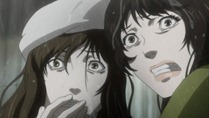
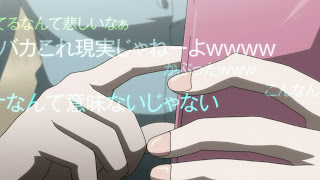
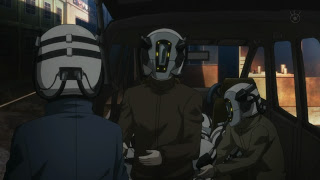
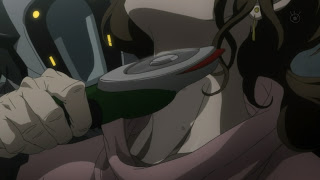
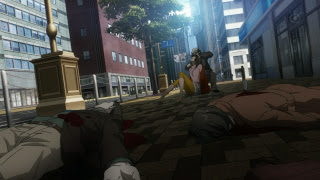
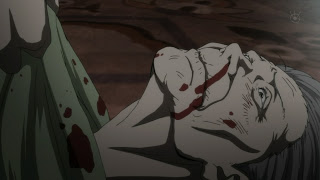
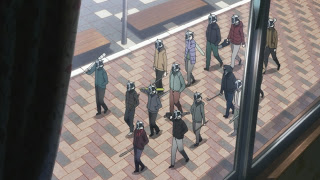


hybridbloodszak
February 2, 2013 at 8:44 amThank you Enzo, this post has been able to express what I haven't been able to other people when I talk to other people about Psycho Pass
The show's bias against Sibyl coupled with that it "tells, not shows" have been major demerits for me. I'm still enjoying this show a heck of a lot but great sci-fi in particular leaves it up to the audience in how to explores the show's themes. A recent example if you play video games is Deus Ex: Human Revolution and the way it deals with transhumanism
Андрей Мохов
February 2, 2013 at 10:06 amThank you for your reviews.
But isn't Shougo's family name Makishima and not Makashima?
admin
February 2, 2013 at 12:11 pmIndeed it is.
dirty water imp
February 2, 2013 at 10:16 amPP would be a better if the anti-Sibyl pov was less heavy handed, but I doubt Sibyl would have an increased number of proponents if depiction was more even keel.
Kim
February 2, 2013 at 1:13 pmI don't really care about the "not original" thing because what really is? It's all about execution and well I think for the most part the series is brilliantly executed.
The other flaw about seeing the flaws of the sybil system too quickly that I agree with. In fact I just think I've been told about the benefits of the system without actually experiencing them. We are told that the population has become so used to a society without crime and yet in the first few episodes we experienced violent crime.
It doesn't ruin the series for me because there is so much else to like but it does take a few the points away.
I do agree that it would be nice if other characters got a chance to do something besides Ko but then I guess the fact that both Ko and Makishima are essentially geniuses makes the upcoming conflict all the more compelling (Makishima might have better back up though with only one right hand man, but who knows Ko's other team members might surprise us yet).
Awet M
February 2, 2013 at 6:49 pmThis is probably the most astute angle of PSYCHO-PASS: a critique of contemporary Japanese society.
The references to sci fi classics (Gibson, Orwell, PKD) give it credibility, and some meta-fictional distance, but the true crux behind this re-imagined dystopian vision is Urobuchi's critique of the potential future(s) of his society.
Beckett
February 4, 2013 at 5:40 amI don't know, it's true that the show doesn't depict Sybil in a "fair and balanced" way, but you have to remember which character's PVS's we are seeing the show from. It's easy to criticize it based on what we've seen, but what we've seen is almost 100% the police dealing with the crappy parts of society. We haven't really seen the Sibyl system from the perspective of an ordinary citizen who just wants to go to work every day and provide for their family while not being mugged or killed on the way there. If we could see it from that angle it might make it easier to understand why people were so willing to accept it.
Of course we know, viewing it from the outside, that the system is flawed, that's the point of the show, but the common people on the street didn't know about any of that until this recent arc began. I think it's pretty easy to understand why people would want to believe in a system that is supposed to make them safe. To paraphrase a Penny Arcade comic, it's a beautiful lie, one they want to believe in, told to them by people they trust. Humans by and large tend to be quick to accept things like that.
Favorite line in the episode was when Makishima said, again paraphrasing since I'm too lazy to look up the actual line, "Funny that a genius hacker like you should be a fan of Gibson." Quite relevant to me as I've recently been re-listening to the audiobook of Neuromancer at work :).
Beckett
February 4, 2013 at 5:41 amWTB edit feature. PVS should say POV, not sure how that happened.